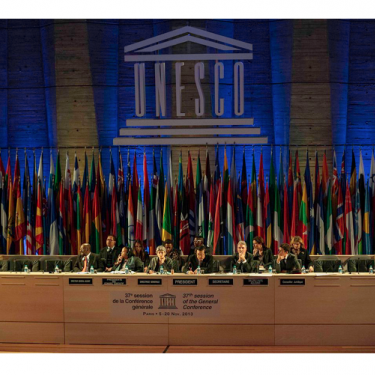Press freedom organizations condemn US withdrawal from UNESCO

Reporters Without Borders (RSF), ARTICLE 19 and the Committee to Protect Journalists (CPJ) condemn the decision by the US government to end its membership of the UN Education, Scientific and Cultural Organization (UNESCO), effective December 31, 2018. It is a serious blow to the work of the international community to strengthen press freedom and the free flow of information globally, and will make the world less safe for journalists and other communicators.
We call on the US government to reverse this decision, and strengthen its commitments to multilateral organizations that promote freedom of expression – a core value to international human rights law and the US Constitution.
UNESCO, founded in 1945, is responsible for coordinating international cooperation in education, science, culture and communication. One of its main objectives is to promote the respect for the human rights and fundamental freedoms. It also has a specific mandate to promote “the free flow of ideas by word and image; it works to foster free, independent and pluralistic media in print, broadcast and online.”
The departure of the US from the body, described by UNESCO Director General Irina Bokova as “a loss for multilateralism”, is also a significant blow to international efforts to protect and promote freedom of expression, in particular press freedom.
UNESCO has recorded the killings of close to 1000 journalists and media workers since 2007, and is the lead UN agency tasked with ensuring the implementation of the UN Plan of Action on the Safety of Journalists and Issue of Impunity. Support for UNESCO is therefore intrinsically linked to ensuring that journalists are safe to do their work, including in some of the most dangerous countries.
At a time when the world is becoming less safe for journalists, and when restrictions on freedom of expression are multiplying, US withdrawal from UNESCO is deeply troubling, especially when coupled with recent vocal attacks on independent and critical media by US President Donald Trump.
“US withdrawal from UNESCO shows that President Trump’s attacks on critical media are more than empty rhetoric, but indicative of a significant shift in the administration away from championing freedom of expression worldwide,” said Thomas Hughes, Executive Director of ARTICLE 19. “Protecting free speech and ensuring journalists’ safety, core US values, requires investing in multilateralism, not running away from it”, he added.
“The US decision to exit UNESCO is a concrete example of the current administration’s contempt for journalism and press freedom,“ says Christophe Deloire, RSF’s Secretary General. “US withdrawal is an attempt to weaken the important work of UNESCO, when on the contrary, it is paramount that it be strengthened at a time when journalists are repeatedly targeted for simply doing their job.”
“UNESCO plays a critical role in promoting the safety of journalists around the world and U.S. withdrawal will weaken UNESCO's ability to address global press freedom violations, creating a power vacuum that could very well be filled by governments that embrace authoritarian tactics," said Courtney Radsch, advocacy director at the Committee to Protect Journalists. "This decision will have global implications for decades to come.”
The US has stated that its decision to withdraw from UNESCO is in part premised on its mounting arrears to the organization, but also on a need for fundamental reforms, including to address an alleged “anti-Israel bias” in the agency. This is the second time the US has left UNESCO, having withdrawn in 1984 to join again in 2003. In 2011, the US withdrew a substantial proportion of its funding to the organization in retaliation for it giving full membership to the State of Palestine.
While the US has indicated that it will remain in observer status at UNESCO, it will have substantially less influence to shape reforms within the agency from the outside.



